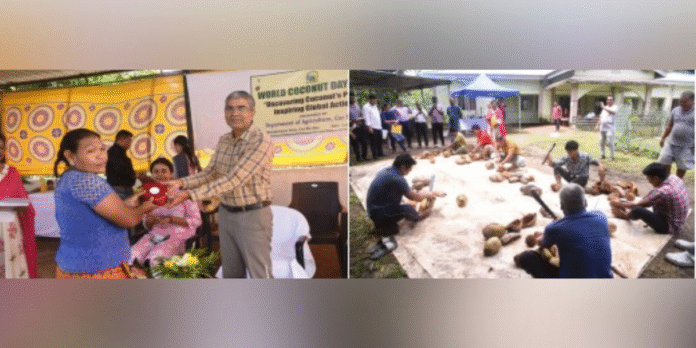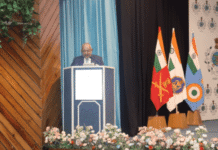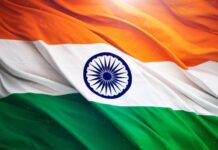Car Nicobar observed World Coconut Day 2025 with a programme held at the Multipurpose Farm in Perka on September 2. Organised by the Zonal Agriculture Team, the event was themed “Uncovering Coconut’s Power, Inspiring Global Action” and focused on the role of coconuts in the cultural, economic, and health fabric of island life.
The programme was attended by senior officials of the district administration, village representatives, and farmers from across Car Nicobar. Deputy Commissioner of Nicobar District Satnam Singh was present as chief guest, while John Chrysostem, Second Headman of Perka Village, attended as guest of honour. The programme also saw the participation of probationary officer Tripti Kalhans and subject experts from the Central Island Agricultural Research Institute’s Krishi Vigyan Kendra.
Speaking on the occasion, the Deputy Commissioner acknowledged the special connection of the Nicobar tribal community with coconuts. He noted that the fruit is not only a staple of island agriculture but also part of religious practice, health traditions, and livelihoods. Farmers were urged to adopt modern techniques and take advantage of schemes from the Agriculture Department and allied agencies to strengthen their incomes.
Assistant Director (Soil) C. Vinod Kumar welcomed the gathering and highlighted the significance of World Coconut Day. He explained how coconuts remain central to the daily lives of the tribal population in Car Nicobar, serving multiple roles in food, crafts, and local economy. Kumar encouraged village representatives and farmers to tap into schemes that support cultivation, post-harvest technologies, and value addition.
Expert sessions covered a wide range of subjects including innovation in cultivation techniques, technology adoption for better yields, and methods for value addition such as producing handicrafts, oils, and processed food products. Officials from the Agriculture Department and CIARI-KVK delivered lectures, connecting traditional practices with modern agricultural science.
To add vibrancy to the celebration, competitions were organised for farmers, featuring displays of coconut recipes, self-made handicrafts, value-added products, and a coconut de-husking contest. Both men and women participated, showcasing the creativity and utility of the fruit in everyday life. Winners of these competitions were recognised with prizes, adding a festive spirit to the technical programme.
An interaction session was also held, providing farmers the opportunity to raise questions with officials of the Agriculture Department and other line departments. Discussions included challenges in marketing, opportunities for cooperative models, and ways to reduce post-harvest losses. The session highlighted the need for closer engagement between farming communities and technical experts to promote better outcomes.
Altogether, 30 farmers from different villages participated in the celebration. Officials described the event as a platform for farmers to gain exposure to innovative practices while also celebrating the cultural importance of coconut in Nicobar society.
World Coconut Day is observed annually to highlight the global significance of the crop. For the Andaman and Nicobar Islands, where coconut palms are abundant and integral to traditional life, the observance serves as a reminder of both heritage and opportunity. With growing interest in value-added products and coconut-based enterprises, stakeholders see potential to expand income sources for coastal communities while sustaining the crop’s ecological role.
For Car Nicobar’s farming families, the celebration offered not just recognition of their work but also guidance on how to integrate innovation and value addition into their livelihoods. With support from technical agencies and government schemes, the hope is that the coconut economy of the Nicobars can evolve to meet both domestic and wider market demands.





